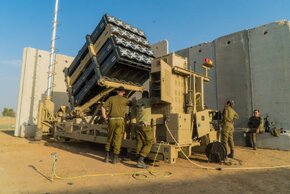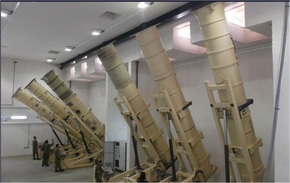Israel's stock market is numb to the situation.

Can Israel do what it set out to do without the US? The big question here, of course, is “what did it set out to do?” It appears that destabilization and, ideally, the regime change is part of the plan.
There are fairly clear indicators that this is a coordinated effort with the US.
- Days prior, we have seen a spike in Pentagon activity.
- Preparation of American assets in the region.
- News of diversion of C-UAS systems from Ukraine to CENTCOM were another indicator.
- The day of the attack also coincides with a deadline on the US-Iran negotiations.
- And diplomatically the US seems to view the strike campaign very positively despite potential negative ramifications.
And yet the US has so far refrained from joining kinetically, which is an indicator that the goal is to bring Iran to the table under much more favorable conditions to the west. For example enrichment, missile production and storage, nuclear weaponization, and conventional defensive capabilities, are no longer a reality which Iran could otherwise leverage in a deal.
Regarding destabilization and regime change:
The main indicators of such are not present. These are example indicators of destabilization:
- Targeting mid-level officers.
- These are the real core of an armed force. Senior command is already more political than professional.
- Junior command, far less experienced, would assume mid-level positions, pulling every command level into outsized structures they're not familiar with.
- Senior commanders occupy a post for a long time, making their deputies and subordinates well positioned for a takeover.
- Targeting Basij
- This is IRGC's volunteer militia.
- Their main task is to ensure public order.
- Unlike regular citizens, they are armed.
- And can easily subdue any uprising.
- Targeting political leadership.
- To keep loyalist citizens disoriented.
- Force IRGC into independence and power struggles.
- Targeting media.
- To keep loyalist citizens disoriented.
- Provision of arms to citizens.
- To initiate an armed uprising.
None of which have happened as of yet.
all evidence that I saw in the past couple of days suggests the opposite and anti-Israel mood in Iran is (my wild guess) is all-time high or there about and so is support for nuclear deterrent.
IRGC loyalists staged a protest. Opposition are cheering for strikes. Your country and whether you consume local media or OSINT, can affect which narrative you see more often. If your country has an inherently more anti-Israel view, they would naturally amplify the IRGC protest, and vice versa.
On this note, while Iranian capabilities of developing nuclear weapons is degraded (some people with good understanding of the subject matter don’t even asses it that way), the capability exists and will likely continue to exist.
Of course. But it's better to strike anyway because getting a bomb later, at a much higher cost, and under humiliating and limiting conditions, is better than having it now.
Israeli intelligence reportedly assessed Iran initiated a nuclear breakthrough (accelerated work on all parts of the nuclear weaponization process).
At the same time, while some top ranking individuals have been eliminated, had the level of penetration, preparedness, and consequences been known beforehand, would their fates be much different? The probability of “it happened for the better” is far from zero.
Assessment of deep intelligence penetration and infiltration of cooperative agents, has been in public domain for years. The problem for Iran was identifying the specific infiltration points. Sometimes they got a few, but never in sufficient quantity.
It appears that after the initial epic failure by Iran, they were able to put together some kind of air defences, organize, etc.
Not air defenses, no. The IDF announced yesterday that it had established aerial superiority.
SAMs located and later neutralized in Tehran. Notice how relatively quickly the camera moves. It indicates the filming object was flying relatively low, perhaps a few hundred meters, at a speed characteristic of a drone.
Israel has indeed achieved superiority over Tehran.
I'm not going to post many more of these videos because I don't want to clutter, but if you'd follow OSINT accounts you'd see many such videos. The IDF is thoroughly working through Iran's air defenses, radars, and TELs.
Of note, my Jewish/Israeli friends were watching various Israeli news yesterday morning (my time), all excited and laughing (the news anchors seemed to share the attitude, while I was scratching my head having read the reports); today, the mood is quite different.
Naturally. So far 10 Israeli civilians dead, hundreds more injured, and residential buildings torn apart by missiles.
For the average civilian this may be a shock. I am more realistic though. Iran has a large arsenal of MRBMs. Israel has a large but not infinite stockpile of ABMs, and Pk against a ballistic missile is naturally lower than vs cruise missiles and artillery. Most civilians are not aware of this. They're used to a reality where Israel has an interceptor for whatever Hamas and Hezbollah can throw at us.
But for those following, nothing about this war is shocking or unexpected. Perhaps the only thing I did not anticipate is IAF's ability to continue hunting TELs effectively past day 1.
Another question I have is how long will Iran be able to sustain their missile strikes on Israel? Benjamin noted that they have something like 20,000 ballistic missiles. This is probably far from the truth, but the point of Israel’s ability to intercept, even with the help of the allies, being slowly degraded is not necessarily lost here.
Israel will likely not run out of interceptors before Iran reduces to Houthi level of output, at which point interceptor production could feasibly outpace output. This is supported by:
- Iran splitting production to support more SRBMs vs US and Arab targets than MRBMs for Israel.
- Large CEP of Iranian missiles. Some new ones are accurate, but too few. If a missile is about to miss, you don't engage it.
- Large portion of Iranian MRBMs still being liquid fueled, thus easier to hunt.
- Israel actually taking very seriously its defensive missile stockpile.
- Israel actively hunting Iranian launchers (likely bottleneck).
- Israel's important assets being either mobile (e.g. aircraft) or well shielded against ballistic missiles (e.g. ABM launchers), or both.
This bad boy could survive fragments from an MRBM falling in proximity. Both the launcher and concrete walls are mobile (transportable).

And this one comes in either a UGF shielded from anything Iranian, or deployable on a truck.

Also yeah 20,000 is a massive exaggeration even taking all SRBMs into account. NYT estimated MRBMs at 1,000, I'd say double or triple that is a safe ceiling estimate. It spent >100 MRBMs every night, plus 100 in each night of the attacks in April and October of 2024. So that's >400 MRBMs gone for what is essentially 0 military damage (except usage of interceptors) and mostly damage to civilians.
Anyway, to me it looks like the direct participation of the Americans is (was) in the calculations (and may still happen). If things end where they are today, give or take, with a few more strike exchanges, the entire effort would be detrimental to Israel in the medium to long term. These are my thoughts at the moment, right or wrong. The bottom line is that now there is a clear understanding by probably everyone in Iran that going nuclear as soon as possible is key.
They (IRGC) came to the understanding that they want nukes decades ago. Nothing that happened today or yesterday convinced them in any direction.
Also IDF said the strike campaign would last several weeks.
Will Israel's attack be counter-productive?
Could Iran now feel their only option is to build a Nuclear deterrent?
It is a reasonable question raised in this Chatham House article:
The article hinges its main theory on 2 assumptions that were debunked a long time ago.
First, there is no such thing as hardliners, softliners, mediumliners, cruiseliners, albeit some airliners, in Iran.
Iran hasn't had a change of leadership since 1985.
Second, there are mountains of evidence pointing to Iran developing nuclear weapons for decades now.
The "Is Iran going to start developing nukes now?" is a theory that ignores Iran's recognized nuclear threshold status.




